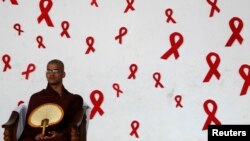The United Nations has welcomed a landmark ruling by Sri Lanka's highest court prohibiting discrimination against people living with HIV in education, saying the judgment would set a precedent and help victims seek justice for other forms of prejudice.
Ruling on a case involving a 5-year-old boy who was denied admission to school because he was believed to be HIV-positive, Sri Lanka's Supreme Court last week said children living with or affected by HIV have the full right to education.
The court also reminded the government of its obligation to take steps to protect, promote and respect the human rights of people living with HIV.
"This is a great day for social justice," said Steve Kraus, director of the UNAIDS Asia and the Pacific support team, in a statement this week. "Sri Lanka's highest court has stood up in support of people who are being left behind. From now on, no child can be denied access to education based on HIV."
The United Nations said the April 28 ruling would set a precedent on the Indian Ocean island, and that victims would now be able to challenge HIV discrimination in other areas such as in accessing health, employment and housing.
First in region
This is the first such ruling in South Asia. While Indian courts have ruled to protect the rights of people living with HIV in specific settings, no country in the region has passed a national HIV law. Sindh province in Pakistan has a comprehensive HIV law, but there is no such protection across the country.
According to UNAIDS, almost 37 million people globally were living with HIV in 2014. There is no comparable figure for South Asia, but World Bank 2010 data said between 2 million and 3.5 million people in South Asia were living with HIV and AIDS.
Despite greater awareness about the disease, many HIV-positive people in South Asia continue to face discrimination in their everyday lives.
In India, for example, human rights lawyers have documented how children living with HIV have been systematically targeted and endured repeated incidents of humiliation, suspension, violence, segregation and expulsion.
The United Nations called on other South Asian countries to adopt laws to protect victims of all forms of prejudice.
"UNAIDS congratulates Sri Lanka on this historic step forward and urges countries in the region to introduce comprehensive laws protecting people affected by HIV against direct and indirect discrimination in all settings," it said.





